In Uzbekistan, people live on $ 200 a month, goods are transported on donkeys, and the capital has become Toshkent.

Belarus, a country of swamps and potatoes in eastern Europe, can find a lot in common with the homeland of Tamerlane and Nasreddin in central Asia. Ordinary citizens are equally open and hospitable. The capitals of states - Minsk and Tashkent - are marked by post-war buildings with wide streets without the dominance of stalls and cars, and the luxurious marble of the metro stations is not covered with plastic advertising. Both Belarusians and Uzbeks, the guides and "legislators" of democratic values tirelessly tell how they should live. But the eastern specifics and troubled neighbors are making their own adjustments to the daily life of Uzbekistan. This was confirmed by a Today correspondent, having visited three large Uzbek cities.

img_1553__
Tashkent. Before Timur, both Stalin and Marx stood at this place.
The feeling that you are not going to prim, bored Europe right at the airport has already appeared at the airport. " Borispol ". A lot of dark-skinned people with huge bales fussed in front of the front desk. The queue moved slowly, since almost all passengers explained themselves for a long time because of excess baggage. The air only got stronger. They barely broke the food service, a neighbor took a souvenir pack of Ukrainian vodka bastards and offered to roll I’ll agree that it’s almost impossible to hear such a thing from an unfamiliar German burgher or an American on the plane. e for the broad Russian soul did not come true. Everything worked. After drinking a glass or two, hospitable swarthy neighbor told a little bit about life at home, gave some useful tips and behind.
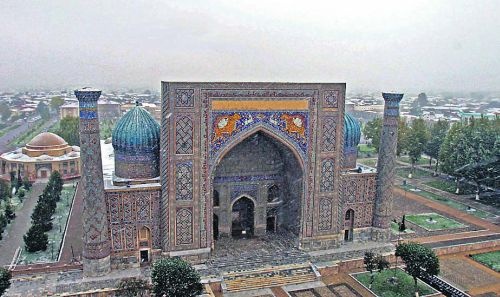
img_2234_1__
Registan Square in Samarkand. People come here from all over the world.
Finally, the airport of Tashkent. Europe with its "green corridors" obviously spoiled us. Here we have already forgotten what it means to fill out a customs declaration. During the flight, I had to remember and enter into the form all the electronic quandaries that I carry on trips. The neighbor insisted that even the ancient, worn down to the holes mobile phone got into the declaration. Therefore, after landing, I internally tuned in for long explanations with unfriendly customs officers. Moreover, in the field of view, people in uniform busily tugged bales of swarthy compatriots. Nevertheless, my luggage crawled through the scanner unhindered, the customs officer somehow inertly inquired as to whether I had declared enough money, slammed the seal, and released it in peace.
But the eastern exotic did not end there. There was no arrivals hall as such. As there was neither a crowd of meeting, nor intrusive taxi drivers. All of this crowd hustled far beyond the airport beyond the fence. It turns out that in Uzbekistan you can only go to airports and train stations with a ticket. At first this is a little annoying, but then you realize the advantages of this order: in the waiting rooms there are no homeless people and suspicious idlers.
POOR BUT PURE
Such a phrase can express the general impression of the country. Tashkent is somewhat reminiscent of Minsk. Which is not surprising. After all, the capital of Belarus was razed to the ground by the war, and the capital of Uzbekistan - an earthquake. Cities are similar in their wide streets without the dominance of cars and stalls. Empty underground passages near the central square of Timur looked unusual. They serve exclusively for their intended purpose, and not for street trading. Next to them is a “pipe” under the Independence Square - just Sodom and Gomorrah. True, the development of Central Asian cities has a peculiarity: it is low-rise, with the exception of individual buildings. This is explained by the large seismicity of the region. Therefore, the streets are wide. If another strong earthquake occurs, there will be no extensive debris in the city, equipment and rescuers will be able to get everywhere.
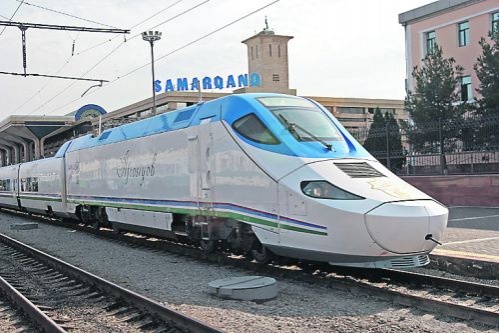
img_1724__
Afrasiob. The train travels 250 km in 2 hours
Unfortunately, I was not able to visit the apartment of an average Uzbek during the trip. Therefore, I tried to determine the prosperity of the Tashkent and Samarkand inhabitants by other signs. For example, looking at the windows of residential buildings in the evenings. So, apartments with the usual European-quality repair in our understanding came across extremely rarely. Few drywall constructions, halogen lamps, double-glazed windows. Basically - modest chandeliers, memorable from Soviet times, carpets on the walls. At the same time, there are a lot of shops full of modern building materials and household appliances, and the interiors of most hotels and offices are fully consistent with the concept of "European-quality repair".
In the private sector there are no front gardens, courtyards, or simply vegetable gardens facing the street. In the outlying districts of Samarkand and Bukhara, you can walk a quarter of an hour, and on all sides only blank walls with the same blank gates will stretch all this time. Just some fortified area. But it is worth going inside - and there will be a courtyard entwined with grapes and a garden. And the interior of the houses will look unusual except for a Frenchman or a German. But for our eyes there is nothing new: this is how the dwelling in the Ukrainian province looks like: furniture in the style of the 80s, full of assorted souvenirs and services. Do you know such glasses in the form of fish? I haven’t seen them in Ukraine for a hundred years, and have come across more than once on this trip.
But wherever you are - on one of the central squares, a market or a rural street - everywhere is clean. I have never seen landfills in ditches, on the outskirts of villages and summer cottages, as it is found on my native "Terens". And the land looks well-groomed. There are no fields overgrown with weeds either. Perhaps this is due to the fact that there is not much arable land here. According to the Food and Agriculture Organization of the United Nations, it accounts for 10-15% of the country's area. The rest can be regarded as pasture. Therefore, Uzbeks value the land, they have become proficient in gardening and horticulture.
HOW THE PEOPLE SURVIVES
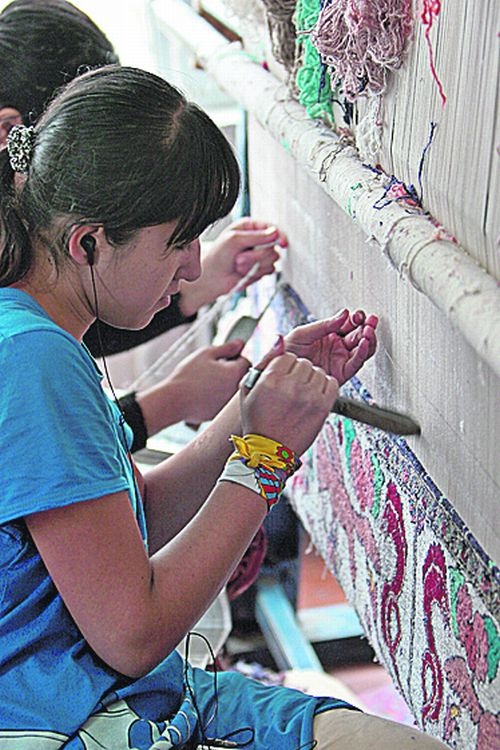
img_2381__
At the silk carpet factory
Nature has not deprived the country of resources. Say, oil and gas make up a quarter of its exports. Gold mining Uzbekistan takes 2nd place in the CIS and 8th in the world. But the key raw material for the Uzbek economy remains cotton (5th place in the world in production and 2nd in export). In the CIS, Uzbekistan remains the main supplier of white gold and its processed products. Add the only other aircraft and automobile factories in Central Asia. If you had to give the country a name by the most common car brand, then Uzbekistan should be renamed "Deustan". Founded in 1992, the UzDEU company flooded the roads with Matisami, Nexia, and Damas, while draconian import duties (30%) hinder the import of imported cars. After Daewoo Motors gave his soul to God, his place was taken by the General Motors auto monster.
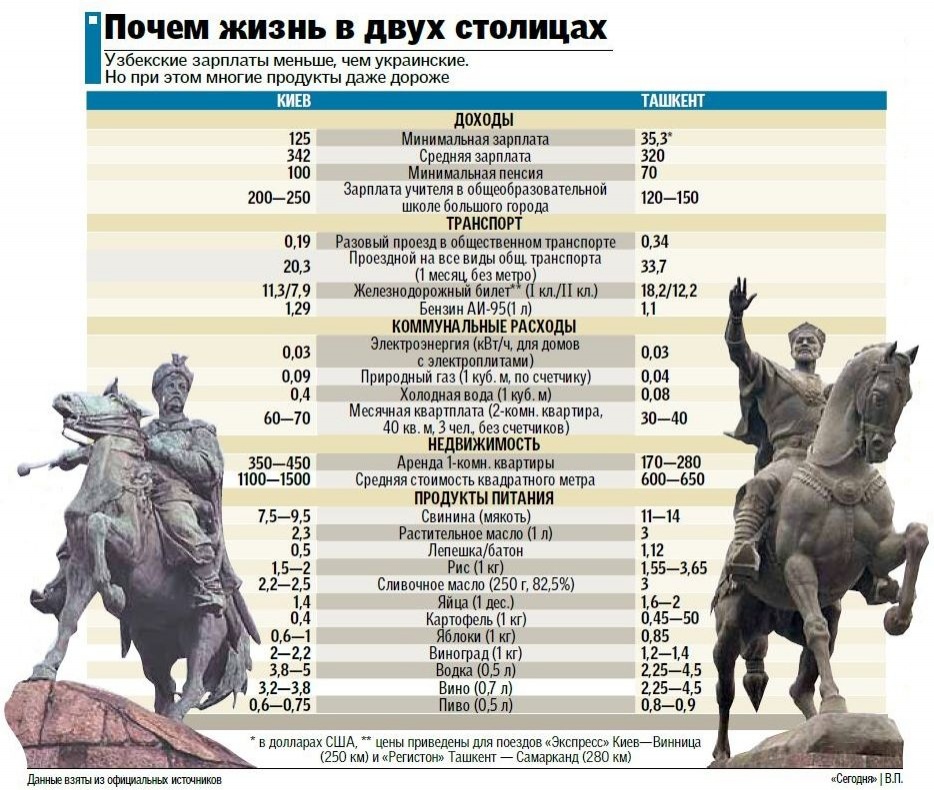
111_05
* Click to enlarge
It would seem that everything looks good. However, from all that was seen on a short trip, the conclusion suggests itself - people live poorly. From conversations, I realized that the officially declared average salary (about $ 300) should be divided into two. A teacher at a provincial school receives about $ 100. A journalist in the capital earns a little more than $ 200 (salary plus fees). The same amount appears in the payroll of the engineer. Among civilian professions, flight attendants ($ 800) and pilots (more than $ 1000) earn well. If we talk about IT-specialists, who in Ukraine are considered to be one of the highest paid, then here units can claim $ 500. Most IT professionals are content with salaries of $ 200-300. If you look at the reports of recruiting agencies on the Internet, it turns out that employees of three areas are most looking for: office plankton, accountants and managers, sales specialists. But we talked about big cities where people work in offices and look for work on the Internet. Those who turn the steering wheel, stand behind the counters and are engaged in other, prestigious work, earn a miserable total. Nevertheless, they do not go hungry and undressed. "Yes, you won’t live on an official salary. We make ends meet simply because many have some small business. The Uzbek will always find something to earn extra money," says the driver I met in Bukhara. By the way, the whole conversation we started with the fact that I asked the guy about empty gas stations on the roads. At first, you pay attention to the fact that they do not have price indicators. Then you notice that there are few cars near the speakers either. “Yes, we occasionally experience interruptions in fuel. In this case, everyone who has a four-wheeled horse tries to stock up on fuel,” the driver said.
MANIFESTATIONS OF EASTERN COLORIT
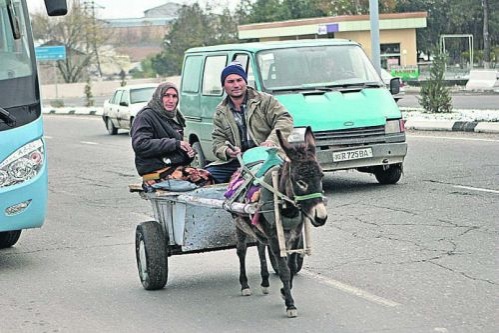
img_2349__
Ishachok. Cartage in Uzbekistan is not losing ground
There is no flashy exoticism in the daily life of Uzbekistan, like the one that catches your eye somewhere in Southeast Asia or Africa. But an observant person will notice many nuances. Like hundreds of years ago, donkeys continue to carry loads that are twice as much in weight as they themselves. In warm weather, Uzbek women wear clothes made of colorful fabric, which you will see only here. And in winter they dress in black. This color here is a sign of solidity. At the Uzbek bazaars, the spirit of the East is felt even stronger. Entire ranks are occupied by rice traders. If we are accustomed only to long-grain and round, then ten and a half of its varieties are sold in the markets of Tashkent and Samarkand, among other things, they also differ in color.
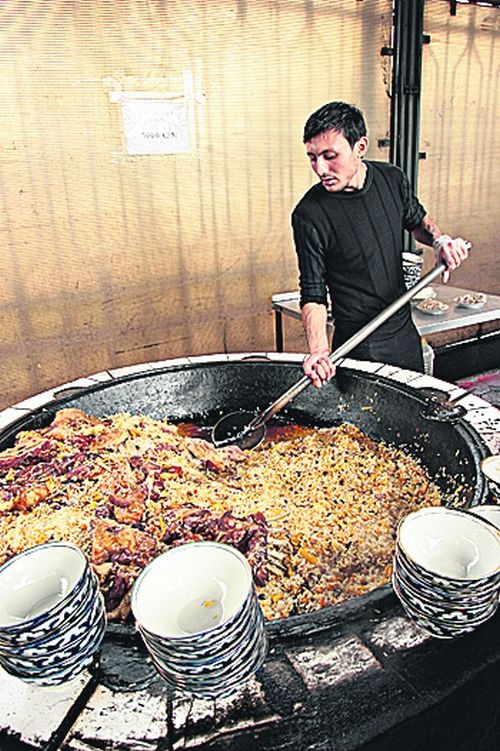
img_1580__
A bowl of pilaf costs about $ 3
For example, devzira has a characteristic pinkish-red tint. And in the neighborhood, huge crystals flaunt on the counter. It looks like "Navot" - a local type of sugar. An impressive cocktail of Western influences and local traditions. The symbol of such a mixture could serve as a young conductor of a high-speed train. The girl supplemented her appearance with a piercing in the nostril, as well as with a pair of gold fixation on the teeth almost obligatory in Central Asia.
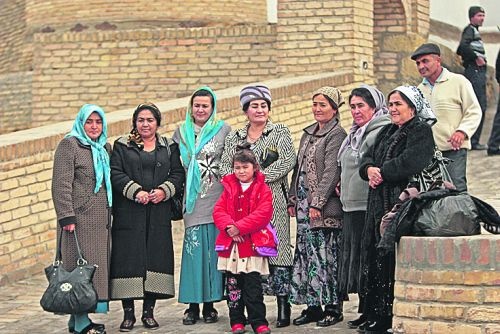
img_1906__
Photo for memory. Older Uzbek women seemed to remain in the USSR
The farther from Tashkent, the more people forget the Russian language and the popularity of English and French is growing. In Bukhara, a six-year-old boy called me "Monsieur" and tried to get hold of money by showing a coin in one Euro . And after a couple of blocks, a little older girl distinctly asked several questions in English and supported a simple conversation. But the older generation has not forgotten the Soviet era. Forty-year-olds generally reacted vividly to Ukrainian speech and gladly specified that they had served in Nemirov or near Berdichev. In short, after the collapse of the Union, the Uzbeks did not change their attitude towards the Russians or Ukrainians. General life in the USSR they were quite satisfied, unlike the same Baltic states. Moreover, Uzbeks cannot be called parasites. For the fact that they supplied the other republics with cotton, they paid for with dried up rivers, saline, chemicals poisoned lands.
But the official approach to the recent past is different. Okay, I don’t like reminders of the Russian Empire. But why remove the monument to Gagarin? Or move out of sight the monument to the blacksmith Shaahmed Shamakhmudov, who adopted 15 orphans of different nationalities during World War II? I admit that the younger generation of readers does not know that more than 1 million people were evacuated from Ukraine, Belarus and Russia to the war in Uzbekistan, of which about 200 thousand were children.
TOSHKENT AND ABDULLO
The Uzbek language belongs to the Turkic group, but knowledge of Turkish will not help the visitor much. Due to influences (Persian, Arabic, Russian), little is left of the language of the Ottoman Empire and Ataturk. “I understand only half of what the Turks say,” the guide says. Changes in the alphabet made an even greater confusion. Since 1992, the Uzbek language has again switched to the Latin alphabet. But no one shows excessive fanaticism for the implementation of the reform.
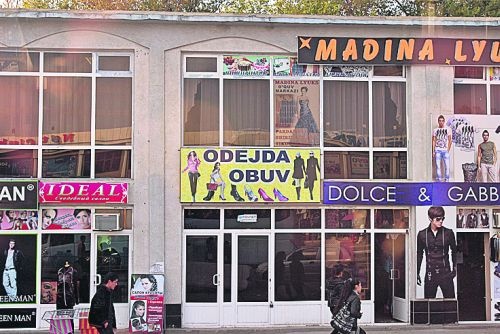
img_1730__
Confusion. On the signs - a mixture of languages, Cyrillic and Latin letters
If the state machine clearly complies with all the requirements, then in everyday life an impressive language vinaigrette is used. The sign "remont sotovix" is quite a common thing. Like many former Soviet republics, Uzbekistan corrected many proper names compared to how the generation of those over 30 remembers them. So, Tashkent turned into Toshkent, Bukhara into Bukhoro, and the hero of the popular Soviet film should be called Abdullo, but nothing not Abdullah.
Read the most important and interesting news in our Telegram
Do you know such glasses in the form of fish?But why remove the monument to Gagarin?
Or move out of sight the monument to the blacksmith Shaahmed Shamakhmudov, who adopted 15 orphans of different nationalities during World War II?